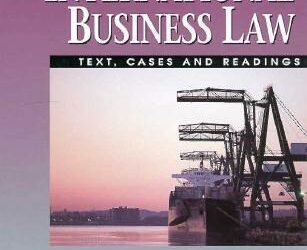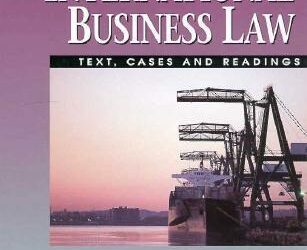How to Summarize a Case – International Business Law

How to Summarize a Case – International Business Law
FACTS OF THE CASE (SAMPLE CASE)
Niko Resources Pleads Guilty to Bribe Charge
Niko Resources says it will admit in court that it bribed a Bangladeshi minister after explosions at one of its natural gas fields.
CALGARY-Oil and gas company Niko Resources Ltd. was fined almost $9.5 million Friday after admitting in court that it bribed a Bangladeshi government minister with the use of a vehicle and a trip to North America.
Calgary-based Niko pleaded guilty to a single charge of providing goods or services to influence the acts or decisions of the foreign state.
Besides receiving fines totaling $9,499,000, the company agreed to a statement of facts read in court.
The value of access to the vehicle, a Toyota Land Cruiser, was $ 190,984 and the value of travel was $5,000.
The bribes were made after explosions at one of Niko’s natural gas fields resulted in a rash of protests from locals in a nearby village and elevated concerns about the environment surrounding the property.
The company said in a release prior to the court session that the guilty plea was expected to “resolve all matters investigated by the RCMP in relation to Niko’s activities.
On the Toronto Stock Exchange, Niko’s shares sank $2.67, or more than four per cent, to $62.25.
The RCMP recently launched an initiative to issue fines for foreign bribery under Canada’s Corruption and Foreign Public Officials Act.
The president of anti-corruption group Transparency International Canada earlier called the indictment of Niko a “great start.”
“Until now there’s really been no enforcement of the Corruption of Foreign Public Officials Act, and although Canada set up the international anticorruption unit of the RCMP a few years ago, we’ve been waiting anxiously for some fruit of that labour, and this is the beginning of it,” said James Klotz.
Niko operates mostly in India and Bangladesh but also explores, develops and produces natural gas and oil in Pakistan, Kurdistan, Indonesia, Trinidad and Madagascar.
In 2009, Niko announced that Canadian officials were investigating improper payments by either Niko, or its Bangladeshi subsidiary, to government officials in the country.
Last week, the company declared a first quarter dividend of six cents per share payable July 15.
FIDA Approach – Facts, Issue(s), Decision and Analysis
Niko Resources
Case Name and Court
R. v. Niko Resources (Alberta Court of Queen’s Bench, 2011) (Note: the purpose of this box is to introduce the FIDA template (or the FIRAC). This case will be fully explored in Chapter 5, Ethical Issues for Global Business.)
Facts
(Here we record only relevant facts and exclude any extraneous information.)
A Canadian company Niko Resources {Niko) experienced explosions at its natural gas field in Bangladesh and faced protests from local residents. Niko then gave a vehicle valued at $190,984 and travel expenses valued· at $5,000 to the Bangladeshi minister for energy lfnd mineral resources because it was he who would decide how much compensation Niko would pay to Bangladesh for the damage.
Issue(s)
(The issue central to the case may be one of law or fact or combined law and fact.)
Because Niko had admitted making the gifts to the minister, the issue was one of law only-that is, did these gifts violate the provisions of Canada’s Corruption of Foreign Public Officials Act (CFPOA)?
Decision
The court found Niko guilty of providing goods or services to influence the acts or decisions of a foreign state contrary to the provisions of the CFPOA.
Analysis/Application
(Here, we briefly identify why the decision was made and also what its significance is for a Canadian company.)
Canadian companies cannot bribe foreign public officials with impunity because this is against Canadian law and the companies can be prosecuted in Canada for their actions abroad. Canada enacted the CFPOA for the purpose of conforming to the OECD Anti-Bribery Convention, which Canada had signed.
FIRAC Approach – Facts, Issue(s), Rule, Analysis and Conclusion
Niko Resources
Case Name and Court
R. v. Niko Resources (Alberta Court of Queen’s Bench, 2011) (Note: the purpose of this box is to introduce the FIDA template (or the FIRAC). This case will be fully explored in Chapter 5, Ethical Issues for Global Business.)
Facts
(Here we record only relevant facts and exclude any extraneous information.)
A Canadian company Niko Resources {Niko) experienced explosions at its natural gas field in Bangladesh and faced protests from local residents. Niko then gave a vehicle valued at $190,984 and travel expenses valued· at $5,000 to the Bangladeshi minister for energy lfnd mineral resources because it was he who would decide how much compensation Niko would pay to Bangladesh for the damage.
Issue(s)
Did these gifts violate the provisions of Canada’s Corruption of Foreign Public Officials Act (CFPOA)?)
(The issue is always in the form of a question. The answer is either Yes or No.)
Rule
Corruption of Foreign Public Officials Act (CFPOA).
Analysis/Application
(Here, we briefly identify why the decision was made and also what its significance is for a Canadian company.)
Canadian companies cannot bribe foreign public officials with impunity because this is against Canadian law and the companies can be prosecuted in Canada for their actions abroad. Canada enacted the CFPOA for the purpose of conforming to the OECD Anti-Bribery Convention, which Canada had signed.
Conclusion
The court found Niko guilty of providing goods or services to influence the acts or decisions of a foreign state contrary to the provisions of the CFPOA.





